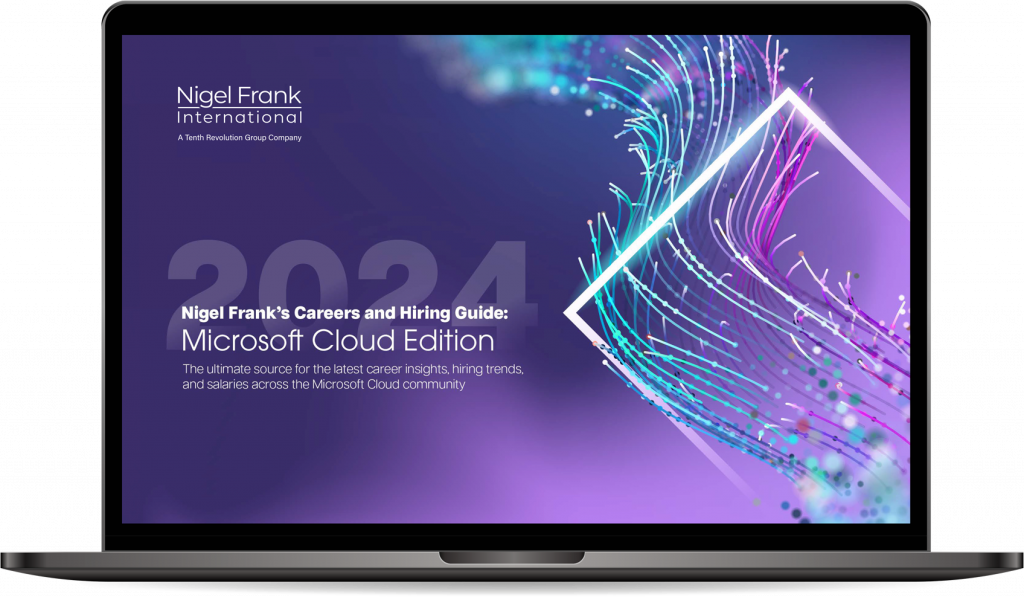


| The ability to demonstrate their skills | 41% |
| Communication | 41% |
| An understanding of the role | 30% |
| Cultural fit | 29% |
| The ability to demonstrate their skills | 41% |
| Communication | 41% |
| An understanding of the role | 30% |
| Cultural fit | 29% |
| Integrity | 29% |
| Confidence | 27% |
| Creativity | 29% |
| Integrity | 29% |
| Confidence | 27% |
| Creativity | 27% |
| Important | Neutral | Unimportant | |
|---|---|---|---|
| Years of technical experience with Microsoft products | 92% | 7% | 2% |
| Exposure to large projects | 87% | 11% | 2% |
| Years of experience in IT | 84% | 13% | 3% |
| Specific vertical industry experience | 71% | 24% | 5% |
| Microsoft certifications | 57% | 26% | 16% |
| College/University degree(s) | 45% | 33% | 23% |
| Important | Neutral | Unimportant |
|---|---|---|
| 92% | 7% | 2% |
| Important | Neutral | Unimportant |
|---|---|---|
| 87% | 11% | 2% |
| Important | Neutral | Unimportant |
|---|---|---|
| 84% | 13% | 3% |
| Important | Neutral | Unimportant |
|---|---|---|
| 71% | 24% | 5% |
| Important | Neutral | Unimportant |
|---|---|---|
| 57% | 26% | 16% |
| Important | Neutral | Unimportant |
|---|---|---|
| 45% | 33% | 23% |
“I believe that creating a personal brand and becoming known either within the industry or within the current partner where you work is important to reach your earning potential.”
Solution Architect, United States
Download our salary tables to better understand what you could earn and compare your salary against your peers.
Find something you enjoy and work towards it
Since you’re going to work for a large amount of your life, try to find something that you enjoy. If you’ve tried something out before and found it interesting, work towards getting into that space. When I started my career, I found that I really liked SharePoint, so I thought about how I could get my hands on SharePoint more.
Once you’ve found your passion, find related careers and think about what that job entails, what the next step up is, and most importantly, are these the kinds of jobs you actually want to do? Plot a potential route, outlining each job on the pathway. You should also think about whether you want to go down a technical path or a managerial one; this will help you plan your pathway.
“Creating a five-year career plan is essentially about figuring out where you want to be, what kind of job you want to do, and outlining the steps you need to take to get there.”
Take advantage of certifications
Certifications are a great way to make progress on your career journey. Find out which certifications align with your goals and plan which exams you aim to take in the next six, 12, or 18 months.
Don’t sweat the timeline too much
Don’t get too caught up on being ahead or behind schedule. Your journey is flexible and can often be impacted by things you simply can’t plan for. Just because you’re ready to take on an architect role, for example, doesn’t mean there’ll be one available at that time.
You might get halfway through your plan and decide you’re not enjoying what you’re doing. Don’t worry, you haven’t lost anything; the skills you’ve learned will always benefit you in some way, shape or form.
Review your plan at least once a year
Take a minute to review your plan every now and then. Ask yourself: Is this still the route I want to take? Am I still enjoying it? Is there something new I’d like to explore?
When generative AI exploded recently, I saw the way the market was headed, and I wanted to know more. So I pivoted towards Azure AI, revamped my plan, took some exams and started learning more. Tech moves quickly, and being adaptable in your career planning will help you seize on great opportunities.
Almost two-thirds (62%) of Microsoft professionals received a salary increase from their current employer in the last year.
On average, those who received a salary increase from their current employer saw their pay rise by 11%.
Let’s see those pay increases broken down further:
| I received an incremental pay increase | 50% |
| I received a performance-related increase | 42% |
| I received a promotion | 20% |
| My organization is more profitable now than it was 12 months ago | 7% |
| Greater demand for Microsoft professionals has increased my market value, and my employer wants to keep me | 3% |
| More opportunities for remote work have increased my job options, and my employer wants to keep me | 2% |
| My organization made staffing cuts and I have taken on more work | 2% |
| I gained an additional Microsoft certification | 2% |
| There's a lack of Microsoft talent in the market and my employer wants to keep me | 2% |
| Other | 4% |
| I received a performance-related increase | 53% |
| I received an incremental pay increase | 47% |
| I received a promotion | 15% |
| Greater demand for Microsoft professionals has increased my market value, and my employer wants to keep me | 12% |
| I gained an additional Microsoft certification | 9% |
| There's a lack of Microsoft talent in the market and my employer wants to keep me | 7% |
| Increased demand for Microsoft services means my organization has more clients than a year ago | 5% |
| Increased opportunities for remote work have increased my job options and my employer wants to keep me | 4% |
| My organization offered staff pay increases due to an increased workload | 2% |
| Other | 4% |

On average, individuals who obtained a salary increase after changing jobs saw a 21% rise in their earnings.
Download our salary tables to better understand what you could earn and compare your salary against your peers.
The majority (79%) of employees who attempted to negotiate a raise were successful, and earned a 15% pay increase on average.
Interestingly, 67% of respondents who have previously negotiated a pay increase said they’re likely to do so again in the coming year.
Reasons for having never negotiated a pay increase are similar in this study as those identified in our previous surveys—and can be grouped into the following themes:
Less than a third (32%) of those who have never negotiated a pay increase say they would feel comfortable asking for one in the future, while 38% feel uncomfortable having that conversation.
Comfort with asking for a pay increase does not seem to have much of a bearing on people’s willingness to pursue one, as 41% of those who have never negotiated before tell us that they plan on doing so in the coming year.

| Salary increase | 90% |
| Promotion | 28% |
| Remote working | 18% |
| Bonus | 14% |
| Flexible working hours | 14% |
| Training and development opportunities | 12% |
| Retention bonus | 9% |
| Additional paid time off | 7% |
| Employer funding for certifications | 5% |
| Shares in the company | 4% |
| Commission | 3% |
| Other | 4% |
On average, those who received a salary increase as part of their counteroffer received a 17% raise.
Over a third (35%, up from 31% in our previous survey) of respondents who received a counteroffer accepted it.
“I was given remote work and better pay; they basically matched what I was going to get from my new potential employer.”
Director, United States
On average, professionals who stayed with their employer after receiving a counteroffer remained in the organization for a further two years. There was an exceptional case where an employee stayed on for 7 years—but this was not typical.
More than a quarter (27%) of those who accepted a counteroffer later regretted their decision.

A competitive salary isn’t the only thing that candidates look for in today’s ecosystem. Candidates continue to prioritize factors like work-life balance, wellbeing, and professional development when searching for their next great role, meaning that employers need to put together appealing and well-designed compensation packages to lure in the best talent. Offering desirable perks that have a real impact on employees’ quality of life can seriously improve your chances of attracting top talent in a market where demand significantly outstrips supply.
In this section, we’ll break down what perks and benefits Microsoft professionals are receiving, what they really want, and how potential employers can mark themselves out by offering candidates something they won’t find elsewhere.
Company laptop
| 5 | Bonus (monthly/biannual/year-end bonus) | 51% |
| 6 | Flexible working hours | 48% |
| 7 | Casual dress policy | 44% |
| 8 | Life insurance | 43% |
| 9 | Four weeks or more paid time off | 42% |
| 10 | Retirement savings plan/401(k) match/pension contributions | 37% |
| 5 | Bonus (monthly/biannual/year-end bonus) | 51% |
| 6 | Flexible working hours | 48% |
| 7 | Casual dress policy | 44% |
| 8 | Life insurance | 43% |
| 9 | Four weeks or more paid time off | 42% |
| 10 | Retirement savings plan/401(k) match/pension contributions | 37% |

Permanent employees who took part in our survey work between 8 and 70 hours per week—with 3% of respondents telling us they work over 60 hours a week.
The average working week for a full-time employee was found to be 43 hours.
Microsoft professionals were asked:
What has caused you to work overtime?

57%

22%

15%

6%
Microsoft professionals were asked:
What has caused you to work overtime?

57%

22%

15%

6%
Professionals working in a permanent role tell us that they receive, on average, 21 days of paid time off (PTO) a year.
The amount of paid time off our respondents receive varies massively from country to country, due to differing employment laws and regulations around minimum vacation time provided to employees. But as companies compete for talent, PTO is becoming a popular bargaining chip for those looking to hire the best professionals. Over the past few years, we’ve seen levels of PTO offered to Microsoft professionals increase, even in regions where PTO is a legal requirement and employees are guaranteed leave. This is likely a response from companies to employees’ desire for better work-life balance, particularly in such a notoriously hardworking sector as cloud technology.
See below for the average PTO days by country of our respondents:











A massive 83% of Microsoft professionals are offered some degree of remote working, with just 17% stating that they work in-office five days a week, and 42% working remotely full-time. This data indicates that any business not offering some degree of home-based or remote working will be in the minority, and, given the high percentage of respondents preferring remote or hybrid working models, will likely be at a disadvantage when it comes to attracting talent. Paid leave continues to be a key differentiator too, with businesses offering above-average amounts of PTO putting themselves ahead with a talent pool increasingly seeking better work-life balance.

Nigel Frank
60 Great Tower Street
London
EC3R 5AZ
United Kingdom



Nigel Frank
60 Great Tower Street
London
EC3R 5AZ
United Kingdom



Nigel Frank
60 Great Tower Street
London
EC3R 5AZ
United Kingdom